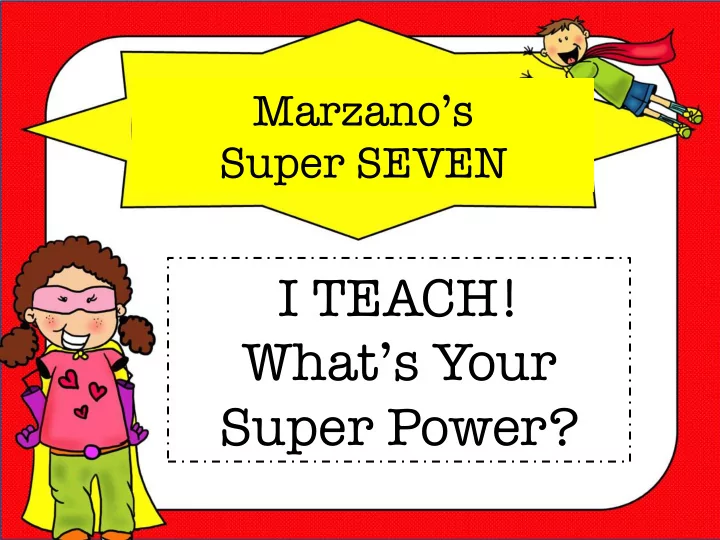

Marzano’s Super SEVEN ¡ I TEACH! What’s Your Super Power?
What are the Super 7 Elements? • These 7 elements are VITAL to the success of LAFS and MAFS instruction! • These 7 elements should become your staples of instruction!
DOMAIN 1: Classroom Strategies and Behaviors Design Questions: 2, 3, and 4 Addressing Content
Identifying Critical Content What do I typically do to identify critical information in my lesson?
To Identify Critical Content you could use: • Visual Activities- storyboards, graphics • Narrative Activities- stories • Tone of Voice, Gestures, and Body Position
Helping What do I typically do to Students help students elaborate? Elaborate on New Content
Teachers you can use: • Elaborate interrogation (After the student answers the question, you probe the answer by asking elaborative questions) • You can have students respond to each other’s questions to elaborate • Graphic Organizers are a FANTASTIC way to have students elaborate!
What do I Helping typically do to help students Students record and Record and represent knowledge during Represent my lesson? Knowledge
To Help Students Record and Represent Knowledge you can use: • Dramatic Enactments • Academic Notebooks • Graphic Organizers • Informal Outline • Student created mnemonics
Helping Students Examine Similarities and Differences How do I use comparison, contrast, and classification activities to support the students’ understanding of the knowledge?
To Help Students Examine Similarities & Differences you can create: • Classification Charts • Bubble Diagrams • Sentence Stems • Venn Diagrams
How can I help students learn to examine errors in reasoning and then encourage students to analyze and evaluate faulty logic? Helping Students Examine Errors and Reasoning
To Help Students Examine Errors and Reasoning with Themselves and Others: • Find evidence in the text to support their response • Identify errors in their procedural process • Identifying faulty logic (common reasoning errors)
Helping Students What do I do to help my students Revise revise knowledge? Knowledge
To Help Students Revise Knowledge you can: • Provide Feedback and ask the student to explain how their understanding has changed after • Provide Students with Scales and Rubrics to compare their work to • Use Academic Notebooks (interactively)
Engaging Students in Whoa! ¡ ¡ ¡ Cognitively Complex Ok…how’s ¡ this ¡done? ¡ ¡ Tasks (Involving Hypothesis Generation and Testing)
To Engage Students in Cognitively Complex Tasks you must first engage the students in an explicit decision making or problem solving inquiry that requires them to: • Ask a question about the content • Utilize resources to find the answer to their question • Present and support their claim using evidence • Identify any common logical errors of themselves or others You can also: • Model and Teach this strategy, provide charts and visual aids to help students remember the steps for each task.
The LAFS and MAFS require more clarity in the progressions of knowledge being addressed in class • More application of knowledge by the students along with more deeper and inferential thinking, and the creation of sound evidence for conclusions and claims is necessary for students to constantly evaluate the validity and accuracy of their thinking and beliefs about the content you are presenting.
• The efforts of the teacher should end with the student being able to describe how the details of the lesson build to support bigger ideas and processes. Using the Super 7 are the instruments to these ends!
For ¡more ¡informa+on ¡on ¡the ¡Super ¡7 ¡Elements, ¡contact ¡Mrs. ¡Goltz! ¡ ¡
Recommend
More recommend